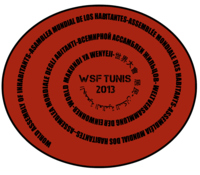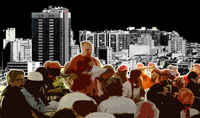The construction of the WAI: The stages of a bottom-up, cooperative and pluralist process
The roots of the WAI can be traced back to the principles established in the WSF Charter , the Salvador Declaration , the World Assembly of Inhabitants (Mexico, October 2000) and the World Assembly of Citizens for Solidarity and a Responsible World (Lille, October 2001) .
Following the considerable success of both the Appeal for the Creation of a Common Global Space of Solidarity for Urban Social Movements and the Madrid Declaration (2008) , which was ratified by more than 600 signatories from 42 countries, a decision was taken to launch a proposal to hold the World Assembly of Inhabitants (WAI) during the WSF 2011 in Dakar.
The WAI process has been sustained by various influences, in particular, by the inhabitants’ organisations debate about the Right to the City and the mobilisation of the “voiceless”. These influences took shape during the Urban Convergences at WSF Belem , which included all the major international networks involved in these issues (i.e. the IAI, HIC, Swedish Cooperative Centre for Latin America, COHRE, LOCOA, Dignity International, SELVIP, PPEHRC, Habitat for Humanity Latin America, ENDA TM, FNRU, No-Vox, the Forum of Local Authorities and certain universities).
The Declaration approved during the Urban Social Forum (Rio de Janeiro, 2010) , where the WAI Global Joint Committee was formed, gave the initiative a concrete form. This set in motion the process of establishing the Joint Committees at regional and local levels, in particular during the Social Forums (United States SF in Detroit, ESF in Istanbul, ASF in Asunción) and other events across all regions and in numerous countries, including Bangalore and Bangladesh in Asia, Senegal and Cameroon.
During the International Days for the Right to Housing (October 2010) in Bobigny (France), the meeting of the WAI Global Joint Committees was held. It was composed of representatives from diverse networks (IAI, HIC, LOCOA, No-Vox), who ratified the convening of the WAI in Dakar during the 2011 WSF, and who assumed the responsibility of defining duties and commitments aimed at promoting the WAI.
The success of the Dakar WAI was demonstrated by the more than 800 participants, originating from 45 countries across all continents, who hosted the 15 self-managed initiatives (workshops, themed meetings, mobilisations) in the headquarters of the WSF and the working-class neighbourhoods of Dakar, adding to the discussion and preparing the plenary Assembly.
The key themes, among others, were: external debt cancellation to finance the popular funds for land and housing; social housing services put in place by the public sector and inhabitants’ cooperatives; popular strategies for dealing with evictions; Urban Reform in economic development; Right to housing, to water, to sanitation and to energy; linkng Right to the City/Right to the Land; and equal opportunities in cities.
This cooperative approach led to the Dakar Declaration: Convergence of Inhabitants for the right to habitat , approved by the final plenary Assembly. The Assembly, supporting the development of this shared space, introduced the Liaison Committee and a shared commitment to the creation of a platform and the global mobilisation for the right to habitat, notably during the October 2011 -2012 World Habitat Days .
The 429 signatures on the Appeal from around the world reinforced this dynamic, continuing throughout the year 2012 , as demonstrated by shared struggles and the joint creation of the Urban and Community Way .
Notable highlights were the People’s Summit (Rio de Janeiro, June 2012) and the Urban Social Forum (Naples, September 2012) , which reinforced the commitment to commons goods as well as bringing the struggles of urban and of rural inhabitants together, notably the alliance with Via Campesina.
Finally, the initiatives organised by the IAI with local partners, in the remit of Africities (Dakar, December 2012) , have allowed inhabitants’ organisations to strengthen their voices, their impact and their recognition, notably on the subject of social housing and the struggle against evictions.
Each of these steps have paved the way, not only for the establishment of a collaborative process in the local social fabrics, but also for the preparatory meetings and the review of the Liaison Committee in view of the 2013 WAI. In this way, the 2013 WAI, convened under the WSF (Tunis, 26-30 March 2013) continues to be built from the bottom up and supported by a multidimensional process of shared experiences and strategies, of building struggle initiatives, resistances and alternatives.
In this way, the axes of the debate and initiatives regarding the struggles of inhabitants are enriched, in regards to: the city which we are opposed (analysis of the urban and global crisis), the city that we are building (exchanges of alternative and activist initiatives for the right to habitat), the city for which we are fighting (creation of a g-local platform of action to build an Alternative Urban Social Pact).
See: Inhabitants’ Memory, Discussion Paper on Inhabitants’ Network Actions “To live well on our planet” (Multimedia collection towards the Urban Way, 2012)
The Volunteer translator for housing rights without frontiers of IAI who has collaborated on the translation of this text was:



